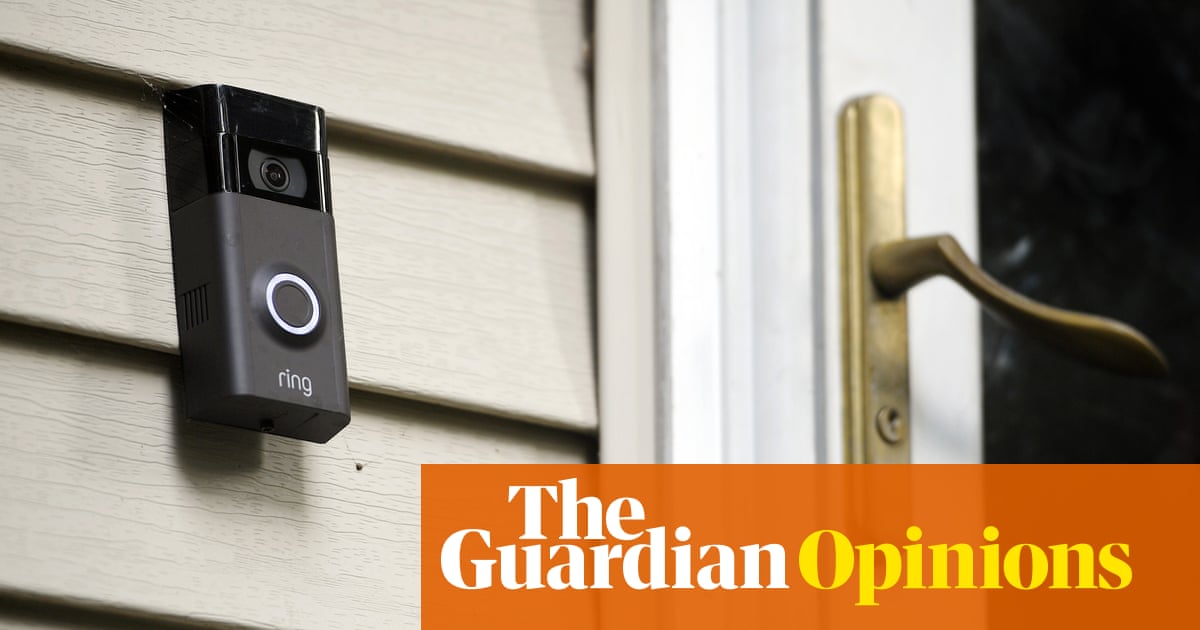
Icame into the kitchen recently to find my husband cradling our electricity smart meter with the kind of tender attention more usually directed to a new-born, his phone clutched in his free hand. “You didn’t turn your office heater off last night,” he said. I didn’t like his tone.
“I did! I went in this morning to turn it on again!”
“You can’t have. Look.” He waved his phone. “Last night we used 10…” (here he added a unit, presumably of electricity, but all that stuff is Martian to me. Ten zaps? Ten whizzes?). “It shouldn’t be that high.”
“But I turned it off!”
But our smart home had spoken and it is far more reliable than me, his life partner of 26 years. Our house now has app-enabled devices to control the heating and the boiler remotely, to check temperature, CO2 and noise levels and to see who is at the door. There are motion-detector cameras in the garden that send us videos of foxes threatening my hens, or his tortoises escaping. Since we installed a few solar panels, my husband’s smart-home management has become more urgent and more granular. An app tells him how much we are consuming, but also how much we are producing, in real time. Now he bursts in when it’s sunny, shouting “We’re giving electricity to the grid! Use more!” In the evenings, I watch Succession; he studies our energy statistics. Technology has transformed him into a one-man home hub. “I used to think home smart technology was pointless,” he tells me. “But it really makes sense.”
I hate it. I don’t want my home to see me when I’m sleeping and know when I’m awake. It makes me feel bamboozled and disenfranchised: how do I make it warmer when I can’t just press a button on the wall? Why do I need an app to answer the door? I also get defensive: the climate emergency means my husband is absolutely right to try to limit our energy consumption, but we end up arguing about how long the heated clothes airer can run (“It’s 6p an hour!” I protest. “That’s not nothing if you leave it on all night,” he counters.) “Aren’t you worried,” I ask him, “You’ll end up like Facebook? The robots will malfunction and you’ll need an angle grinder to boil the kettle?” But he’s an engineer: no angle-grinder scenario could faze him.
I am the one who is out of step: our homes are smarter than ever. Tools with cosy, nature-inspired names (Nest, Hive) allow us to monitor and control homes even when we aren’t in them; other one-word devices (Blink, Ring) keep them safe. A 2019 survey found 57% of British homes have at least one kind of smart device; back in 2018 YouGov found 8% of homes have two or more. It’s too early for definitive research, but it seems Covid #stayathome living, perhaps combined with feeling life was out of control in other ways, increased our desire to micro- manage our environments. A government report found almost half of UK residents purchased at least one smart device during the pandemic and more than half said their smart device usage had increased. But what does this mean for the home-environment variable you can’t control with an app: human relationships?
“It’s almost inevitable that you wouldn’t both be equally keen on it,” says technology writer Charles Arthur. “You almost have a new way of living in your house, which you thought you knew, but now it’s: ‘Don’t touch that!’” For Hilda Burke, psychotherapist, couples counsellor and author of The Phone Addiction Workbook, smart tech has facilitated a perennial source of relationship conflict: temperature and energy usage. “It’s something that has been around for ages, but (now) it’s more data-driven and quantifiable. Before, you might not have evidence, but now there is.” Burke wonders if the urge to control and manage our homes is some kind of evolutionary throwback expressed through technology. “It is probably down to something quite basic and primal, like keeping a balance between being safe and warm and not depleting resources.”
Plenty of others feel there are three people in their relationship and one of them plugs in. I asked around and gathered their tales of domestic techno-woe. Joel and Anna live in Sydney with two young children and a house full of smart tech: a voice-controlled home pod that uses Siri, Google Home for shopping lists and a raft of programmed, motion-activated lights. Joel is the enthusiast: “I have always been into computers and gadgets,” he says. “I tolerate it because a man must have his hobbies,” says Anna. Some elements, however, she finds challenging. “I have been driven to minor furies with settings not working the way I think they have been set up. Joel’s not here and I’m bustling around trying to turn things on and off and it simply won’t respond to me.” She’s also wary of the home pod: “It does a little ‘boop’ noise, like ‘I’m listening to you,’ which is creepy.”
Anna likes the smart lights, which dim in the evening, go red for nocturnal loo trips and switch on automatically when they return home. But even these cause problems, leaving babysitters plunged in darkness, or turning on unexpectedly: Joel set the lights to notify him when an Uber arrived, then went out to find it, leaving Anna and her mother in an inexplicably flashing house. “It was terrifying,” says Anna; “I can see that was a mistake,” concedes Joel.
Things get weirder when we invite Alexa, Siri and friends into our relationships. One recurrent complaint about virtual home assistants is their tendency to only obey one half of a couple. “Our Alexa refuses to respond to me,” says Robert. “She’s linked to our lights, only answers to my husband, who has to rescue me when it gets dark. This morning she inexplicably put every light on. Point blank refused to turn them off when I asked.” When Robert’s husband gets involved, Alexa is “entirely compliant”. My friend Rhian feels similarly snubbed. “Alexa is a soldier of the patriarchy,” she says. “Fully ignores me, while responding immediately to Paul. She refuses to listen to women.”
Joel and Anna have experienced this too, though Joel believes his tech is not inherently misogynistic. “Because I set it up, I know exactly the phrase that needs to be used and Anna doesn’t,” he explains. “She’ll say it slightly wrong, then I say it and to her ear it sounds like I’m saying exactly the same thing in a calmer voice.” “It’s very annoying,” says Anna. They have both also struggled with shopping items that the Google Home mangled (‘Mississippi’ for miso soup; ‘shut up little Caesars’ for sharp little scissors’). Some have it even worse: “My Alexa interpreted ‘maple syrup’ as ‘nipple rings’, says Leona. “It was an unpleasant episode.” Rebecca’s Alexa told her son “Every Christmas present that was being delivered to him.”
It’s not all relationship doom. There are happy robot-human thruples out there. Some households have seamlessly integrated virtual assistants, viewing them as a drawback-free life enhancement. They include my friend Lydia’s. “Siri is a valued member of our family,” she says. “She tells us stories and jokes and how to spell things.” Sara’s family uses Siri to resolve arguments – “So much so that I feel we need Siri on retainer as our therapist,” she says.
Smart tech can also be a godsend for people living with a disability or health condition. Lisa-Marie has limited mobility and fine motor skills following a spinal injury; she loves the Google Home installed by her partner: “I find it genuinely useful, particularly on bad health days. My best bit is being able to switch the lights on and off from the sofa or bed.” Grudgingly, I see the benefits, but resent living in a house full of gadgetry I don’t understand, digitally highlighting my failings (yes, maybe I did leave that heater on). Hilda Burke urges those of us feeling left behind or irritated by a partner’s smart home tech to analyse whether it’s their behaviour, or our reactions, that are the problem. “We can get quite meddlesome, when it’s their time and their choice,” she cautions. For those, like me, occasionally feeling judged and found wanting by a coalition of robot-harvested data plus partner, Burke says: “There are parent, adult, or child ways we can respond. It’s not easy to be an adult: that parental voice – when someone says, ‘Did you put the radiator on?’ – brings us back to childhood.” The key to avoiding conflict is to respond calmly, as an adult: “Yes, I was feeling cold,” rather than expletive-laden bluster.
Perhaps we hold-outs will grow to love the cosy glow of a warm, bright home greeting us as we come in from the cold; a playlist starting up as the smart lock lets us in. But that might not be the end of our problems: what if we’re not smart enough for our smart homes? My husband is happy with all the circuitry he learned in his engineering studies, because some smart tech is genuinely tricky to install and maintain.
“I hope I die first,” is a common sentiment among tech-averse householders. “I live in fear of my husband dying before me, because I have no idea how any of it works and will be facing a dirty, cold, housebound life,” says Candida. Tom, who is responsible for the smart tech invasion in his home, worries that if he died, his family would be unable to function and would “grieve in cold darkness, soundtracked by the noise of the burglar alarm.”
Spurred by this, and my husband’s imminent two-week trip to the States, I delicately raise the question of what happens if he falls out of the sky. “You need to find and remove the circuit breakers,” he says, instantly losing me. “But it won’t be easy.” I’m urging him to update his will accordingly. The robot takeover may be imminent (I hope you’ve said please and thank you to Alexa and Siri), but who inherits them before it happens?












